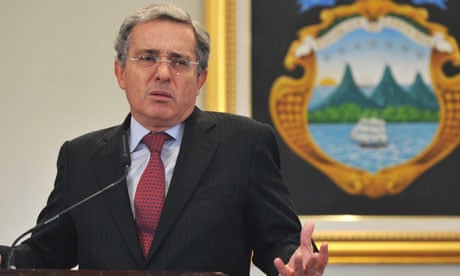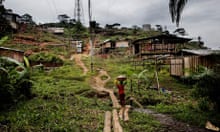A jailed Colombian paramilitary chief has accused former President Alvaro Uribe of sponsoring his illegal armed group in the mid-1990s.
In the video, Pablo Hernan Sierra says he organised a militia that operated from the Guacharacas ranch owned by Uribe's family in the northwestern state of Antioquia in 1996 when Uribe was the state's governor.
Uribe is widely praised for security gains against leftist rebels during his 2002-10 presidency, and Sierra is the first former paramilitary leader to directly accuse him of sponsoring the illegal militias responsible for most killings in Colombia's long-running conflict.
The video, which was presented by leftwing congressman Iván Cepeda on Wednesday, was recorded last month when he visited the prison where Sierra is imprisoned for murder. Cepeda's aides said Sierra was convicted of killing an indigenous leader but they could not immediately provide details.
Uribe has long denied any links to paramilitaries and on Wednesday accused Cepeda via Twitter of "desperately seeking more calumnies" against him.
In the video, Sierra does not say whether he spoke with Uribe or saw the former president give orders to the militia fighters.
He does give an explanation, however, for why the paramilitary band was allegedly created: A leftist rebel leader had stolen 600 head of cattle from the ranch as well as mules and horses including one "paso fino" horse prized by Uribe, which incensed him.
Cepeda, who said he turned the video over to Colombia's chief prosecutor, Viviane Morales, acknowledged that Sierra is seeking a reduced sentence.
"I believe the time has come that the country launches an investigation into former President Alvaro Uribe for the presumed creation of paramilitary groups and for criminal acts that these groups committed in Antioquia and in many other places across the nation," Cepeda said at a news conference.
Colombia's paramilitary groups were first formed in the 1980s to protect ranchers and drug traffickers from leftist rebel extortion. They later evolved into murderous criminal gangs that prosecutors estimate committed more than 50,000 killings.
This is not the first time allegations have been made that a rightwing death squad operated from Guacharacas.
Leftwing politician Gustavo Petro made a similar accusation in 2007. And last year, a former police major who worked in the region in 1994 said that Uribe's younger brother, Santiago, ran a death squad from Guacharacas during that time.
The former police officer, Juan Carlos Meneses, said Santiago Uribe paid him to allow the death squad to operate and estimated it killed at least 50 people.
Santiago Uribe denied the accusations, and Meneses said he had no evidence that Alvaro Uribe had any knowledge of the illegal militia.
When Alvaro was governor he openly supported civilian self-defence groups known as convivir that human rights groups accused of death squad activity.
Uribe's father was killed by rebels in 1983.
Cepeda's father, a communist senator, was assassinated a decade later by a death squad that included two soldiers.


